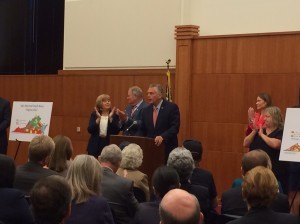RICHMOND, Va. — In a much-anticipated announcement, Gov. Terry McAuliffe on Sept. 8 laid out a ten-point plan to cover more low-income Virginians’ health needs.
But to the disappointment of his most avid supporters who relied on his 2013 campaign pledge to expand Medicaid, the Democratic governor didn’t go so far as to expand the program unilaterally. McAuliffe had indicated previously he would do “whatever it takes” and hinted he would expand Medicaid through executive action.
“As governor, I have to do what the law allows me to do,” he said when one reporter asked if he’s reneging on his campaign pledge to expand Medicaid.
McAuliffe blamed the General Assembly for not closing the “coverage gap.” Both House and Senate chambers rejected his proposed expansion.
“I’m actually glad that the governor chose the path he took,” said Republican state Delegate John O’Bannon, a neurologist and member of the legislature’s Medicaid Innovation and Reform Commission. “He acknowledged the separation of powers and acknowledged he did not have the authority to do an executive order like Washington and expand the Medicaid part of Obamacare.”
The Medicaid Innovation and Reform Commission, which McAuliffe tried to eliminate in this year’s legislative session, has been tasked with finding ways to reform the program before considering expansion.
Federal funding for expansion doubted
The plan McAuliffe ultimately presented will still cost the state tens of millions of dollars, but nothing near the price tag that would have come with expanding the Medicaid program to a new population.
Under the Affordable Care Act, the federal government promises to pay the full freight for now, shrinking to 90 percent by 2020, in states that expand eligibility up to 133 percent of the federal poverty level. Many budget hawks are skeptical about federal funding promises, however.
“I don’t believe that the federal government, which is $17 trillion in debt, is going to make good on its promise,” said Sean Lansing, state director for the Virginia chapter of the fiscally-minded citizens Americans for Prosperity. “If there’s one thing that I think most people regardless where they stand on the political spectrum can agree on is that Washington is good at one thing, and that is breaking promises.”
Lansing said it would be an “incredible disservice” to Virginia’s neediest to throw them into a “broken program.” One in four doctors in the state aren’t accepting new Medicaid patients according to a report by the General Assembly’s Joint Legislative and Audit Review Commission, partly because Medicaid reimbursements are so low compared to private insurance.
Nearly a quarter of the state budget already goes toward Medicaid, said Mike Thompson, president of the Thomas Jefferson Institute, a Virginia-focused public policy think tank.
Thompson wondered what would happen if Virginia added hundreds of thousands of people to the program and the federal government reduces or eliminates the promised funding.
“What are the states supposed to do? Do you kick all these people off?” Thompson said.
On top of uncertain federal funding, Virginia also faces a major budget shortfall. McAuliffe announced this summer that unless something changes soon, revenues will be $2.4 billion or more short of expenses over the next three years.
“When this debate started, Virginia had a balanced budget,” Thompson said. “Virginia is now looking at what will probably end up at a $3 billion deficit.”
Proposal, future action uncertain
With his revised plan, called A Healthy Virginia, McAuliffe will expand coverage for about 20,000 Virginians with severe mental illnesses and expand existing coverage for about 13,000 Virginians with serious mental health issues who are already enrolled. McAuliffe said that first part is still pending approval from the Centers for Medicare & Medicaid Services.
“We are still working to understand the specifics of his proposals, and especially how they are being funded given the current challenges the state is having with revenue shortfalls,” said Republican state Delegate Steve Landes, vice chairman of the Medicaid Innovation and Reform Commission.
The General Assembly is scheduled to return to Richmond on Sept. 18 to consider Medicaid expansion and their own package of health care reforms.
“Really the bottom line is, we can do better,” Thompson said.
Kathryn Watson writes for Watchdog.org, where an earlier version of this story was originally published on September 9. Photo by Kathryn Watson.




